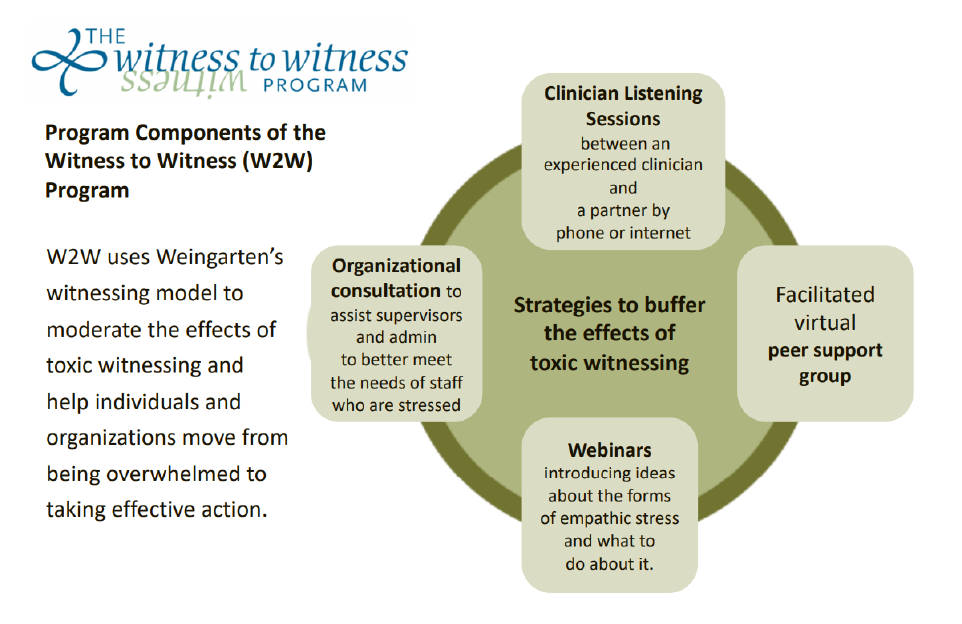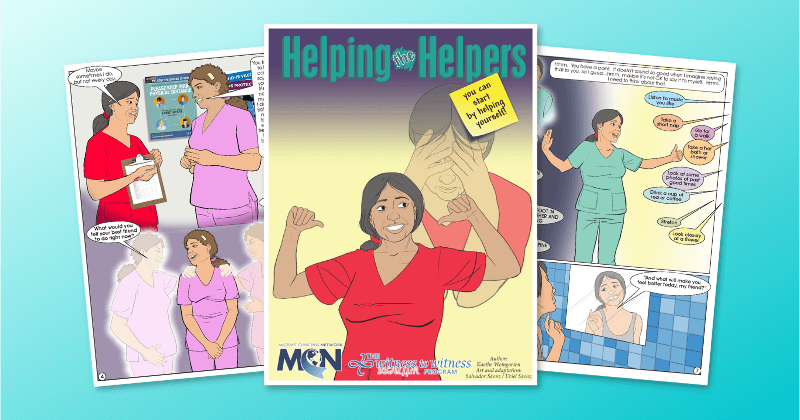Witness to Witness (W2W)

The Witness to Witness (W2W) Program serves those who are in high stress jobs working with clients who are themselves experiencing high levels of stress. Whether we realize it or not, we are all witnesses to experiences and events that cross our thresholds for comfortable coping. Whether we witness a distressing event in person, hear about it from others, or see it through social media or on television, exposure to these types of events or stories creates what is known as "common shock." This term was coined by Kaethe Weingarten, PhD, Founder and Advisor, The Witness to Witness program, to capture the widespread, yet often unnoticed, impact that witnessing can have on our mind, body, and spirit. For many of us, overexposure to stories of hardship, crisis, and suffering can create common shock.
The witnessing model was developed by Dr. Weingarten in the 1990s to help people understand that they were experiencing common shock and provide ideas about how to mitigate the harmful effects. The model asserts that there are four witness positions. Ideally, one is in Position One, where one is aware and empowered, able to respond with clarity and effectiveness. However, we may find ourselves in any of the other three positions. In Position Two, we are actually unaware of what is truly happening and so our responses are misguided and may even be harmful. In Position Three, we are either oblivious or purposefully managing what we witness by zoning out. Position Four is the most common position of all, where we are perfectly aware of what we are witnessing but lack either the internal or external resources to respond effectively. This position saps our energy, leaving us frustrated and unable to act in alignment with our conscience. This is the witness position that can lead to burnout.
Recognizing our witness position is crucial, as it provides the opportunity to consciously move toward a more empowered and effective stance, where we can reduce harm and build capacity for individuals and teams to thrive.
At MCN, we incorporate this approach into all our mental health and well-being programs, ensuring that clinicians, essential workers, and others on the frontlines have the support they need to continue their vital work while caring for their own well-being.
W2W serves a range of providers in many parts of the country who work with populations like people who are displaced by disasters or fleeing unsafe situations. Those we serve may be suffering from stress, empathic stress, or distress from being unable to act in alignment with their values.
To request an interactive webinar, peer support group, or learning collaborative for your organization, contact:
If you want to stay informed about the W2W Program,
Resources
We have found that these articles are helpful to those with daily exposure to challenging work situations. Many people doing this important work feel inadequate to the tasks they face. They feel helpless to create the outcomes they want for the people they serve. Their distress is a symptom of their kind and compassionate nature. These articles provide a framework for understanding their situations and ways of relieving the distress.
Helping the Helpers
Available in English and Spanish
Introduction to the Witness Model
Introduction to the Witnessing Model - Common Shock: English and Spanish
What we do
The Witness to Witness (W2W) Program serves those who are in high stress jobs or volunteer roles where they come into daily contact with people who are themselves experiencing high levels of stress.
Peer Support Groups
Isolation is a common response to feeling overwhelmed. By contrast, social support is the most effective and efficient way to cope with stress. W2W offers facilitated open enrollment peer support groups for clinicians.
Interactive Webinars
W2W offers individualized interactive webinars and accompanying resources, each of which are archived. Topics may include but are not limited to: the witnessing model, empathic stress disorders, creating healing-centered care environments, reasonable hope, practical self-care strategies, team meeting debrief structures, and more.
Learning Collaboratives
We offer a multi-week, practical learning collaborative for supervisors and administrators to help them develop work environments where individuals and teams can thrive.
W2W provides targeted consultation based on initial organizational assessment. Workers describe “in-box trauma,” when they receive notification of new policies that will impact the work they want to do. W2W offers a multi-week, practical learning collaborative for supervisors and administrators to help them develop stronger individual and organizational capacities to navigate the many complexities of today’s environment.
Resource Development
We develop resources that are comprehensive and tailored to specific audiences.

What Constituents Are Saying About W2W
Comments from W2W Partners
"The W2W program has become an invaluable resource for me… I am so grateful to W2W for sharing their expertise and knowledge… W2W truly cares for the caregivers, and I could not be more thankful."
"I feel so grateful for this model, this way of working, and to you for implementing it…. I believe things would be different if everyone working here was receiving this kind of partnership."
"Five stars, two thumbs-up."
Comments from Interactive Webinars
"What a generous webinar! Thank you very much. The material is helpful to me personally and provides very useful content for developing a supportive program for our needy hospital staff to be enriched as well."
"Wonderful and applicable information presented thoughtfully and clearly by a compassionate subject matter expert."
"The workshop was very informative and educational. I took back very important points and concepts from this webinar."
"Thank you for the fantastic training! It was one of the best I have been to in years, super informative, relevant and helpful."
Comments from Peer Support Groups and Learning Collaboratives
"Each session brought me hope and clarity, so serving the community felt more attainable."
"Really appreciate that this topic has been so thoroughly explored, it really validates my experiences and helps me feel hope that I can be sustainable in my role."
Comments from Consultations
"Thank you for adapting the trainings to our specific programmatic needs. The trainings provided us with the time to step out of our day-to-day work and stress and process the emotional toll our jobs are taking on us. Thank you for your adaptability and in-depth knowledge of trauma-informed practices."
|
|

